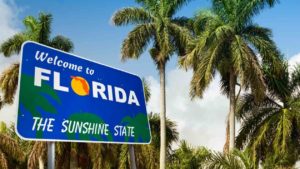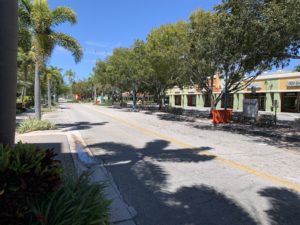
Miami and South Florida have been the talk of the tech world in recent months.
While high taxes and a panoply of problems plague tech hubs such as San Francisco, New York and Boston; low tax, great weather South Florida seems to be on every tech titan’s radar.
It’s a great story driven by the media, economic development professionals and Miami’s tech friendly Mayor Francis X. Suarez who is using Twitter to court Silicon Valley CEOS.
Star venture capitalists, billionaire financiers and tech CEOS are coming to the Magic City and the Sunshine State and that’s a good thing. We need to diversify beyond tourism, paving the Ag Reserve and serving as a retirement haven.
But not everyone is on the Miami/South Florida bandwagon and there are some headwinds to overcome as well.
One of the doubters is influential blogger Tyler Cowen.
Cowen is an economist.
He is also a professor at George Mason University, where he holds the Holbert L. Harris chair in the economics department. So he’s got credibility.
But a large part of his influence stems from his blog “Marginal Revolution” which is eagerly followed by a lot of deep thinkers in the business and tech worlds.
Here’s what Professor Cowen had to say recently on his blog about Florida.
“In Miami and Miami Beach I had a wonderful time. But I don’t see the area as a new and budding tech center. Many tech entrepreneurs moved there during earlier phases of the pandemic, but many have since left. Perhaps the region is more of a place to spend tech money than to earn tech money.
The positives for southern Florida are clear: It is a major crossroads with significant connections to Latin America and the Caribbean, it is a fun place to live, Miami Mayor Francis X. Suarez is pro-tech, and there is no state income tax.
Yet that is not enough. Miami does not have a top-tier university, and the city does not have much of what I would call “nerd culture.” The city’s first language is arguably Spanish, but the tech world is mostly English, and its current ties to Asia are more important than possible future connections to Latin America.
Renowned venture capitalist Keith Rabois is in Miami and is a staunch advocate for the city. It would not be surprising if Miami developed a few significant tech companies due to his influence. Miami could also become more of a center for crypto wealth. If you’ve earned a billion dollars through Bitcoin, and live part of the year in Puerto Rico to avoid capital gains taxes, is there anywhere better to hang out and spend your wealth than Miami?
All that said, I do not see Miami as a serious contender to be a major tech center.”
Ouch!
First, the University of Miami may take exception to not being considered a “top-tier” institution. A few other local universities may also be chafed as well. Yes Dr. Cowen is right—we don’t have Stanford but we do have several institutions that are rapidly gaining steam and prestige. FAU has made strides, Lynn University is renowned for being innovative, Nova Southeastern is doing some cool things and so is FIU.
We are getting there—fast.
We have some terrific—although in the case of the Business Development Board of Palm Beach County underfunded—economic development organizations that consistently punch above their weight and some local Eco Dev rock stars such as Boca’s Jessica Del Vecchio. I’m also pleased that Delray finally hired an economic development director—it’s needed and long overdue. Let’s hope the office gets some adequate resources and freedom to innovate.
In addition, Florida has some great CRA’s—if local and state politicians would give them some room to do their thing— which is build great places that attract investment.
But there are headwinds too.
At a recent meeting of economic stakeholders in Palm Beach County, there was good news and challenging news as well.
Here’s a summary of a recent Economic Forum call:
According to Kelly Smallridge, President and CEO of the Business Development Board of PBC:
- A Task Force at the BDB asks the question “Are We Ready” with respect to infrastructure – not only physical infrastructure, but also support systems for employees.
- The BDB is finding that there are no homes available for mid-level managers or support staff.
- There are no openings in private schools.
- The Task Force will make a presentation to the County Commissioners in the near future to outline the opportunities and the challenges facing the county.
Development Trends:
- Many of the office buildings in West Palm Beach are fully leased. (Can this be true? If so, bravo considering Covid etc.)
- Developers are snapping up infill property in the downtown core.
- Zoning changes are needed to support quality infill development.
- There are difficulties in obtaining building permits— especially in the county. There are quite a number of open positions in this department. Palm Beach Gardens and Boca seem to have zoning down “perfectly” according to the participants on the forum.
From our friends at the Housing Leadership Council:
- There is a need to change the zoning for the old one story shopping centers on Congress Avenue and Military Trail and re-zone for multi-story housing.
- The Council is trying to get a study done on this concept.
- They are also working on a $200 million Housing Bond. The business community needs to come out in favor of this.
So as you can see there are opportunities and challenges.
As for me, for what it’s worth, I’m bullish.
A friend of mine is wired into Silicon Valley’s tech scene and he says the valley’s supremacy is here to stay. I agree.
But he also says that world class venture capitalists are finding their way to South Florida. That’s a great sign for the future.
As for talent– remote work and technology will enable Florida based companies to attract engineers from the region and all over the world. Many of the most gifted founders will end up living here at least for part of the year. My guess is that Boca and Delray will snag their fair share of the next generation’s stars if they put out a welcome mat.
The lifestyle is too good, the value proposition too compelling.
Are we ready?
We need to be because the switched on cities in the region will find the next decade to be a golden age. The places who can solve the problems of housing and schools will win. The places that don’t will be left in the dust.
